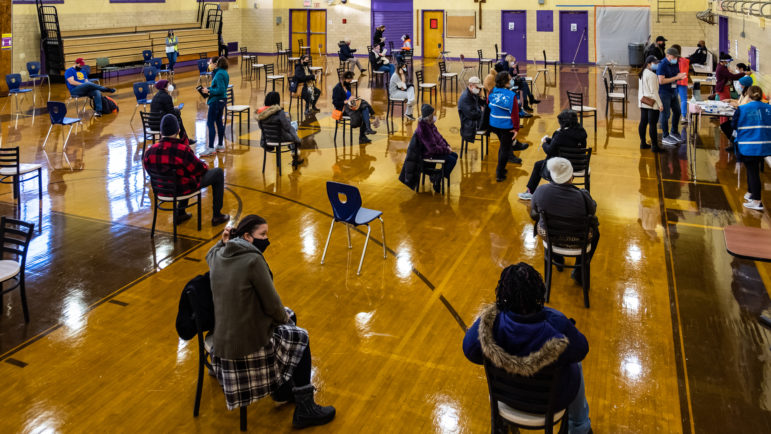Mayor de Blasio is asking the federal government to allocate more doses for the city, to account for those who work and get vaccinated in New York but don’t reside here. He also wants permission for the city to tap into its reserve of second doses while it awaits more vaccine supply.

Adi Talwar
A vaccine distribution site at the South Bronx Educational Campus located on St Ann’s Avenue.Although addressing a once-in-a-century pandemic would be challenging for New York regardless, the lack of a national strategy from the federal government since the start of the crisis has led to greater strain on city and state resources, and more uncertainty in an already uncertain time for New York City.
But now with a new administration in office and a national strategy being rolled out, Mayor Bill de Blasio expressed optimism Monday for the city’s vaccination program going forward, after a delayed vaccine shipment led the city to cancel vaccination appointments for thousands of New Yorkers last week.
“I am very, very optimistic about what this new administration is going to mean for all of us here in New York City,” the mayor said at a briefing on Monday. “What is so clear now is the commitment of the Biden administration and the leading health experts in the administration to finding every conceivable way to get us more vaccine quickly.”
The mayor added that he’s still waiting on more detailed information for the federal government’s “game plan for specifically increasing the supply of the vaccine” over the course of this week, but that “there’s a real dialogue going on” now with leaders in Washington — a shift since Biden took office.
So far, the city has administered 628,831 vaccine doses, well short of de Blasio’s earlier goal of 1 million doses by the end of January, a shortfall the mayor blamed on lack of supply. The city had just over 19,000 remaining first doses on hand at the start of this week.
“We have mega sites like Citi Field and Yankee Stadium ready to go. We want to get those to be full-blown 24-hour operations, but we don’t have the vaccine,” de Blasio said Monday.
In a letter sent to President Joe Biden on Friday, the mayor said the new president’s inauguration has “given us hope” and expressed the city’s support for the administration’s overall strategy, which Biden laid out in 200 pages of policy the day after taking office. The plan is organized around seven goals, such as executing a “safe, effective, and comprehensive vaccination campaign” as well as protecting people most at risk and advancing equity.
Bruce Y. Lee, a health policy and management expert at CUNY School of Public Health, says it wasn’t a surprise to him that there had been problems with the initial vaccine rollout due to the lack of federal planning.
“If you look at the months and even the weeks leading up to the [FDA] emergency-use authorization and the rollout, there was very little talk, discussion, or open conversation about how the vaccine rollout and distribution will actually occur,” he says. “At most, you’ve heard stories of health facilities being told to get ready for the vaccine in the weeks leading up to the rollout. But no clear plans were really shown from a national level.”
On Sunday, Biden’s chief of staff Ron Klain confirmed Lee’s observation, revealing that the Trump administration had not set up a distribution plan for the COVID-19 vaccines.
Biden’s plan calls for a $25 billion investment in vaccine manufacturing and distribution that “will guarantee it gets to every American, cost-free.” Given that both chambers of Congress are now controlled by the Democrats, getting this magnitude of funding passed by Congress is now more likely to happen.
In his letter, de Blasio praised the president’s pledges to provide local governments with advance notice of dosage allocations, and to speed up vaccine manufacturing under the Defense Production Act, which gives the president the authority to mobilize resources and production at private companies to meet the country’s national defense needs. So far, the administration has specifically mentioned using its authority under the Act to get specialized syringes that would reduce vaccine waste to increase the number of available doses.
De Blasio also urged President Biden, in his letter, to reconsider how doses are allocated for New York City and other areas of the country that vaccinate greater numbers of people who work in the city but don’t live there. Vaccine doses are currently allocated based on resident population, despite the fact that non-residents account for almost a third of people vaccinated within the city so far.
The mayor is also asking the federal government to allow the city more “flexibility” in how it distributes its doses, specifically requesting permission to use its remaining supply of second doses “to maximize first dose vaccinations” until the supply is replenished.
“New York City is well-positioned to contribute significantly to your goal of 100 million doses administered. It’s going to take all we’ve got, and New York City stands ready to do our part,” de Blasio wrote.
Nicole Javorsky is a Report for America corps member.
Read more:









